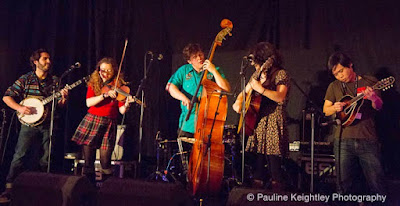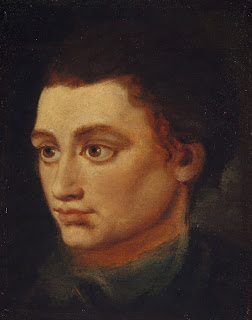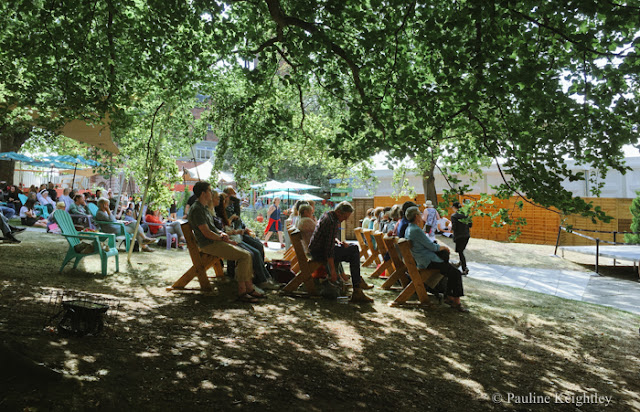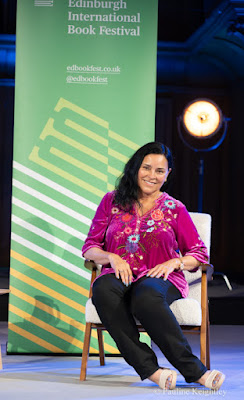 |
| EIBF at Futures Institute |
'Together We Repair' at Edinburgh International book festival EIBF 2025. The question now is – to repair what path must we follow. We are mostly confused.
**EIBF 2025
Edinburgh international book festival 2025 program has been announced,
Runs from 9th August to 24th August. This year our program features over 600 writers and artists from 35 countries, who have a wide range of perspectives on topics of personal, social and global importance.
And will included famous names such as Nicola Sturgeon, Irvine Welsh and Diane Abbott
Authors Maggie O’Farrell and Alexander McCall Smith, actors Brian Cox, Viggo Mortensen, Sam Heughan, and Vanessa Redgrave. The Fun Lovin’ Crime Writers band will perform, with novelists Chris Brookmyre and Val McDermid.
Sturgeon will launch her memoir, Frankly, and will be in conversation with journalist Kirsty Wark as part of the Front List series. While Welsh will discuss his new novel Men In Love, which features the characters from Trainspotting as they experience the heyday of rave culture in the late 80s and early 90s.
*Plus workshops. Bookbinder Rachel Hazell will lead a workshop, Junk Journals Workshop, where old books will be re-fashioned into journals.
This year’s children’s program will include more than 100 events for young readers, including from renowned authors Michael Rosen, Jacqueline Wilson and Cressida Cowell.
*Words from the Wards - With Illustrations by art students
We believe that everyone has a story to tell and that stories help us make sense of our world. We’ve challenged local writers and poets, this year, to respond to 2025’s Festival theme: Repair. Join us as we bring them together to perform their work: a patchwork of ideas on how to make the world a better place.
“We invite you to come and learn something new, feed your curiosity and to broaden your horizons.”
PLUS illustrations for Words from the Wards, the festivals Children’s program.
Festival director Jenny Niven said: “This year’s key theme of Repair starts from the belief that the brilliant ideas of writers and thinkers can help us repair a host of seemingly ‘broken’ things in our society, from the cycle of fast fashion and our relationship with the environment, to cultural reparations and the state of our politics. It’s a statement of hope and resilience, and an invitation for our audiences to think about what ‘repair’ might mean for them.
“At a time when important conversations can feel impossible to have without igniting conflict and anger, we want the Edinburgh International Book Festival to provide a safe place for challenging but considered discussions. This year our program features over 600 writers and artists from 35 countries, who have a wide range of perspectives on topics of personal, social and global importance. We invite you to come and learn something new, feed your curiosity and to broaden your horizons.”
Ian McEwan – Sunday August 13:30 – 14:30
Sam Haeughan: on the Rocks – Saturday 23 August 18:15 – 19:15
AC Grayling: Disagreeing Agreeably – Friday 22 August 17:00 – 18:00
Sometimes it feels like we can’t talk about anything without further polarising opinions. Join author and philosopher A C Grayling as he seeks the middle-ground in an incendiary debate. Drawing from his new book, Discriminations: Making Peace in the Culture Wars, Grayling shares a fresh take on how we might navigate the messy politics of cultural conflict by recognising the nuance between competing rights and interests.
Some famous names – speak up! The People Speak – Sunday 24 August 17:00- 18:00
Acclaimed writers and actors, including Viggo Mortensen (The Lord of the Rings, Captain Fantastic) and iconic Vanessa Redgrave (The Devils, Atonement, Mrs Dalloway), for powerful performances of stories, speeches, and songs of protest and rebellion from around the world, and across history. Inspired by the work of people’s historian Howard Zinn and directed by Anthony Arnove (co-editor with Colin Firth of The People Speak), their words shimmer with strength, inspiration, and a vision for a better future. Hosted by Anthony Arnove.
The question now is – to repair what path must we follow.
Half of Scots want independence. Would federalism work? Does Labour work? A big white hope their limited business plan. While Reeves believes in tight reins and her fiscal rules. Scotland is stuck under City of London rules.
An economic policy for best outcomes for the people of Scotland.
'Scotland is a land laden with opportunity,' writes economist Richard Murphy.
We are not small at all – Why are Scots politicians afraid when there is only fear of fear itself.
I hear a Drunk man looks at a Thistle,
Parcel of Rogues bought and sold
I hear freedoms sword will strongly draw.
I hear Scotland is stuck,
Certainly we must Repair - The big question is -
How much disrepair, crisis, emergency is Britain in?
It seems to be a lot. We can’t ignore. Years of a tough austerity and lack of investment –
followed by Covid, the damage of Brexit, cost of living crisis,
with crumbling infrastructure and lack of funding.
New Labour offer a few crumbs.
Repair? Is it possible, in our stuck, fake, out-dated systems here in Britain? Stuck in its 1688 British Constitution?
We must ask how serious is Britain’s crisis? Political debate has become like a meaningless ping pong ball that no one believes anymore. We’re all lied to. But when Consultants feel disillusioned we must surely worry. And when politicians these days are not serious people.









.jpg)
.jpg)



.jpg)






























